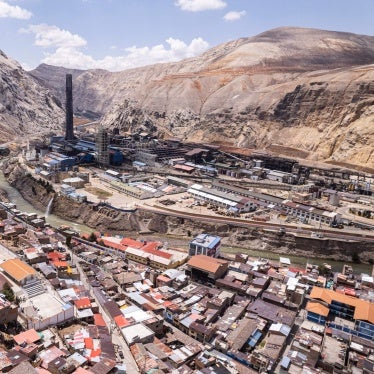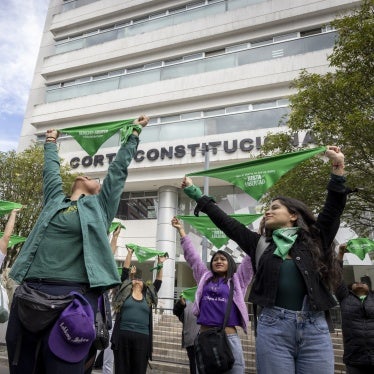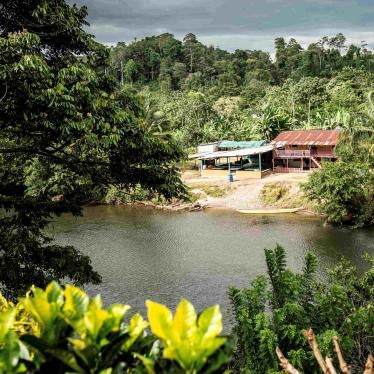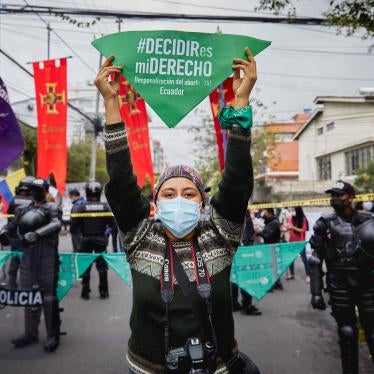I. Summary
This submission, drawn from recent Human Rights Watch research, focuses on four areas of concern regarding Canada’s human rights record: violence against indigenous women and girls, counterterrorism, abuses related to the extractives industry, and the use of cluster munitions. It also examines Canada’s adherence to commitments made in response to its first Universal Periodic Review (UPR) in 2009.
II. Violence Against Indigenous Women and Girls
Serious concerns persist regarding Canada’s response to the widespread violence against indigenous women and girls in the country. During Canada’s first UPR, the government stated that it was committed to “identifying the causes of violence against Aboriginal women and developing appropriate responses in consultation with Aboriginal and civil society organizations” and accepted many detailed recommendations in this regard. However, since that review, the government has taken steps that call into question its commitment to meaningfully engage with indigenous communities on the issue of police accountability for responding to such violence.
In 2010, the government ceased funding the Sisters in Spirit (SIS) initiative of the Native Women’s Association of Canada (NWAC), which had collected data showing that nationally 582 indigenous women and girls had gone missing or been found murdered in Canada, with 39 percent of the disappearances and deaths occurring since 2000. The government has since committed to funding NWAC’s “Evidence to Action,” a follow-up to SIS programming, for three years. However, the statistical monitoring of cases of missing and murdered indigenous women and girls that was a part of the SIS database initiative–the only database of its kind in Canada–is now to be assumed by the National Police Support Centre for Missing Persons, run by the Royal Canadian Mounted Police (RCMP), Canada’s national police force, with government funds allocated to improve the Canadian Police Information Centre database on missing persons. Police forces in Canada are not mandated to collect ethnicity data; thus there is currently no precedent for the routine collection of such data in RCMP missing persons databases. While the center is still in development and the database will not be fully operational until 2013, it will lack the independence and focus of the NWAC data initiative.
Human Rights Watch is currently conducting research into police treatment of indigenous women and girls in northern British Columbia. As of 2010, the SIS initiative had documented approximately 160 cases of missing and murdered women in British Columbia, considerably more than any other province or territory in Canada. The province also had the highest unsolved rate of murders of indigenous women and girls. An ongoing provincial inquiry into missing and murdered women floundered when many of the nongovernmental organizations (NGOs) granted standing were unable to participate in the inquiry due to the lack of provincial government funding for counsel. A number of community groups representing the interests of the missing and murdered indigenous women have since refused to engage with the inquiry, citing concerns about the exclusionary and discriminatory nature of the process. The resignation of the inquiry’s first appointed independent counsel for indigenous interests over the lack of attention to indigenous communities’ concerns–including entrenched discrimination, poverty, and economic and social inequalities that contribute to indigenous women’s exposure to violence–has further undermined the inquiry’s legitimacy.
While some attention has been paid to addressing open cases involving missing and murdered women, including through the RCMP’s Project E-Pana, families continue to express frustration with delays and inaction by the police in response to the disappearances and deaths. These problems extend to the policing of violence against women generally. According to reports received by Human Rights Watch from domestic violence survivors and community organizations in northern British Columbia, calls to the police are frequently met with skepticismand victim-blaming.
In addition to examining police failure to investigate violence committed by others, Human Rights Watch is investigating the abuse of indigenous women and girls in RCMP custody, including reports of physical assaults, sexual harassment, and poor conditions of detention. Complaints of police misconduct are themselves investigated by police. Although a civilian complaints commission monitors the processing of public complaints against the RCMP and external police teams investigate the more serious allegations, current practice does not provide the accountability of an independent civilian mechanism. Furthermore, fear of retaliation obstructs access to existing complaint mechanisms, particularly for women and girls who live in small communities, are street-involved, or have had multiple contacts with the criminal justice system. Notably, the Canadian government failed to provide complete information in response to a request from the Committee on the Rights of the Child (CRC) for the number of reported cases of abuse and maltreatment of children occurring during their arrest and detention. A recent class action lawsuit brought by more than 150 current or former RCMP officers alleging gender-based discrimination and sexual harassment within the national police force raises added concerns about discrimination within police operations.
III. Counterterrorism
Since Canadian citizen Omar Khadr was first detained by US forces in Afghanistan in July 2002 at the age of 15, Canada has failed to protect his rights and in fact has been complicit in the violation of his rights under both international and Canadian law. Throughout his detention, he has never been afforded the special protections provided for detained child soldiers under international law, including segregation from the adult population. Despite a commitment to favorably consider an application by Khadr for transfer from the US detention facility in Guantanamo Bay to Canada, the Canadian government delayed approving his transfer, finally repatriating him on September 29, 2012, almost a full year after he was eligible under the terms of his plea agreement. International human rights law ensures the right of a national to return to his or her country. While this right cannot be invoked to avoid lawful punishment, Khadr had pleaded guilty to alleged crimes in a military commission and requested transfer to Canada to serve out the remainder of his sentence, not to be released. During his detention by the US, Canada also failed to ensure Khadr was provided with rehabilitative services as appropriate for a former child soldier.
Canada has also maintained problematic policies with regard to the use of intelligence information obtained through torture. Canada has refused to disallow reliance on information obtained from governments with known records of human rights violations, including obtaining information through torture or other ill-treatment. The Canadian Security Intelligence Service (CSIS), the RCMP, and the Canada Border Services Agency have all received a ministerial-level directive permitting, in some circumstances, the use of information obtained by other states through torture, or information that once shared, may result in torture or other ill-treatment. One prominent instance of the use of evidence possibly obtained by torture is the detention of Mohamed Mahjoub on a “security certificate.” Mahjoub was first detained in June 2000 on suspicion of involvement with the Vanguards of Conquest, a faction of al-Jihad al-Islamiya, in Egypt. In September 2012, then-public safety minister Stockwell Day testified that at the time he signed Mahjoub’s security certificate in February 2008, he had received a memo from CSIS Director Jim Judd warning that it was “difficult, if not impossible” to determine whether the information justifying Mahjoub’s detention had been derived from torture as it had been shared with CSIS by governments with a reputation for using abusive interrogation.
IV. Extractive Industries
Canada is the most important hub of the global mining industry and is home to some 75 percent of the world’s mining and exploration companies. The global reach of Canada’s mining industry is of central importance to the Canadian economy and to the economies of many developing countries. But mining can be an incredibly destructive industry if not carried out responsibly and with adequate government oversight–with profound negative impacts on mining-affected communities. Many Canadian mining firms work overseas in countries whose governments cannot or will not effectively regulate the human rights practices of multinational companies operating on their soil.
Currently, Canada’s government does nothing to monitor, let alone regulate, the human rights practices of Canadian firms when they operate in other countries. This has led to numerous abuses and has stained Canada's international reputation. For instance, Human Rights Watch research uncovered evidence of serious abuses including gang rape by private security personnel employed at the Porgera gold mine in Papua New Guinea—a project majority owned and solely operated by Canadian firm Barrick Gold, the world’s largest gold mining company. The company responded by committing to serious action to remedy the situation—but the disturbing fact remains that in the absence of a strong government role, the company failed to detect or act upon these abuses itself. The Canadian government currently has no mandate to even investigate such situations, and no way of knowing how many similar problems Canadian firms might be involved in around the world.
Human Rights Watch has consistently argued that the best way for Canada’s government to play a responsible role with respect to these industries would be to exercise greater oversight and regulation of Canadian companies’ human rights practices abroad. A 2007 roundtable process that included representatives of both industry and civil society arrived at a series of useful recommendations about the way forward on this issue, including the creation of an ombudsman’s office to investigate allegations of abuse. None of the key roundtable recommendations were implemented by the government, and industry support for them has waned considerably. A modest legislative effort to empower Canada’s government to monitor the human rights practices of Canadian extractives companies operating abroad was defeated in parliament in 2010. The mining industry lobbied heavily against that bill, which Canada’s government also opposed.
V. Ratification and Implementation of the Convention on Cluster Munitions
The Canadian parliament is in the process of debating proposed national legislation (Bill S-10) designed to implement the 2008 Convention on Cluster Munitions, allowing Canada to ratify the treaty. While Human Rights Watch encourages Canada to become a full state party to the instrument banning cluster munitions, Bill S-10 raises many concerns. As written, several provisions would fail to achieve, or even run counter to, the convention’s goal of eliminating cluster munitions and the human suffering they cause.
While the bill has numerous shortcomings, most disturbing is that it creates large loopholes to the convention’s absolute prohibitions during joint military operations with states not party to the convention. For example, it would allow Canadian forces to direct or authorize the use of cluster munitions by states not party, expressly request the use of cluster munitions in certain situations, and themselves use the weapons while on secondment to allies who have not joined the convention. Bill S-10 also could be understood to allow stockpiling of cluster munitions in and transit of them through Canadian territory, and it fails explicitly to prohibit investment in the production of cluster munitions. Proponents of the bill argue that exceptions are allowed under article 21 of the Convention on Cluster Munitions, which addresses joint military operations. That provision, however, should be read as a clarification that military operations with states not party are permitted rather than as a qualification to the convention’s absolute ban during such operations.
VI. Recommendations to the Canadian Government
On violence against indigenous women and girls, Canada should:
- Develop and implement a national action plan to address violence against indigenous women and girls that addresses the structural roots of the violence, as well as the accountability of government bodies charged with preventing and responding to violence.
- Collect and publish accurate and comprehensive disaggregated data that includes an ethnicity variable data on violence against indigenous women and girls in cooperation with indigenous community organizations.
- Ensure police accountability for thorough investigations of violence against indigenous women and girls through enhanced oversight of such cases from the time that a disappearance or an act of violence is reported.
- Expand training for police officers to counter racism and sexism in the treatment of indigenous women and girls in custody and to improve police response to violence against women and girls within indigenous communities.
- Establish independent civilian investigations of reported incidents of serious police misconduct.
On its treatment of child soldiers, Canada should:
- Provide rehabilitation services to Omar Khadr while still in detention and upon release, as well as provide services to assist in his reintegration into Canadian society.
- Investigate and hold accountable those responsible for failing to protect Khadr’s rights under the Canadian Charter and international law, and establish policies to prevent any similar denial of rights to child soldiers who may be captured by foreign forces in the future.
On the use of information derived from torture or other ill-treatment, Canada should:
- Disallow reliance on any information believed to be obtained by Canada or any foreign country that was likely derived from torture or other ill-treatment.
- Refuse to share information with other states where there is reason to believe that information may lead to torture or other ill-treatment.
On the extractives industry, Canada should:
- As an urgent priority, establish an ombudsman’s office or some other mechanism to monitor the human rights conduct of Canadian oil, mining, and gas companies operating abroad and to investigate credible allegations of human rights abuse.
- Introduce legislation to implement the full range of recommendations from the 2007 National Roundtables on Corporate Social Responsibility and the Canadian Extractive Industry in Developing Countries.
On cluster munitions, Canada should:
- Ratify and implement the Convention on Cluster Munitions.
In order to implement the Convention on Cluster Munitions, pass national legislation that:
- Prohibits explicitly and absolutely the use, production, transfer, and stockpiling of cluster munitions, and assistance with those activities under all circumstances, including joint military operations.
- Prohibits foreign stockpiling and transit of cluster munitions.
- Prohibits investment in the production of cluster munitions.








